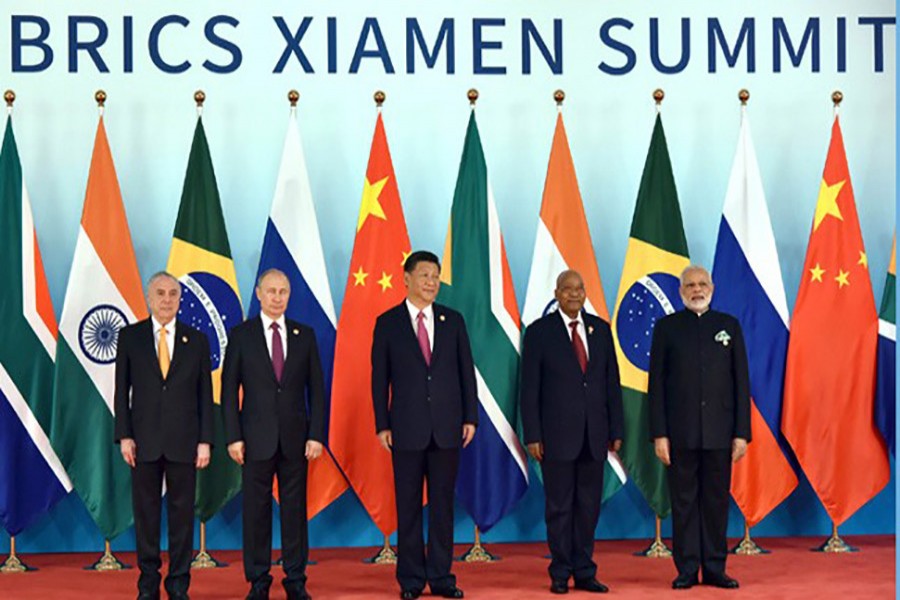The 9th edition of BRICS Summit started in the southeastern Chinese city of Xiamen on Sunday with a call for increasing intra-BRICS trade and investment ratio which the leaders say 'still remains untapped'.
Leaders of the alliance of five major developing economies said although economies of the member countries are growing remarkably over the years, the investment and trade scenario of BRICS states within the bloc is far below the level of expectation.
Besides other key issues, they said BRICS (Brazil, Russia, India, China and South Africa) nations should pay serious attention to the issue and cooperate each other to raise the volume of mutual trade and investment within themselves for a sustainable development of people of the countries.
At the same time, China has promised to invest additional US$4.0 million for further supporting business operations of New Development Bank (NDB), commonly known as BRICS Bank, which is moving for issuing bonds in national currencies to other member states after successful trial in China.
While delivering keynote speech at the BRICS plenary session on Monday with presence of heads of all member states, Chinese President Xi Jinping said despite the achievements the bloc has made, the potential for cooperation has yet to be fully unleashed.
"The five countries' foreign investment totalled US$197 billion in 2016, but only 5.7 per cent took place between BRICS members," the president said.
On the other hand, India Prime Minister Narendra Modi proposed for creating a separate rating agency under the BRICS to meet the financial needs of sovereign and corporate entities of developing countries.
He strongly pitched for setting up an independent rating agency based on market-oriented principles, saying that it would further help the economies of member countries and other developing countries.
The proposal was, however, accepted by other countries in the bloc in accordance with the 71-point of Xiamen declaration made on the day. It is expected that the would-be rating agency would be acted to counter dominated western agencies like S&P, Moody's and Fitch.
Vice-Minister for the Ministry of Commerce at a briefing Wang Shouwen said China has taken technical and economic cooperation framework through which the BRICS countries could improve their capacity to overlap international markets and conduct mutual investment and trades in a efficient way.
For example, contribution of the BRICS to the global GDP is 23 per cent but its contribution to the global foreign trade is 16 per cent while the volume of mutual trade is only less than 6 per cent of total grant trades among the BRICS, he said.
"Comparing to our economic sizes, there are many potentials of the five countries still remain untapped and we've to work on that areas to improve our position in international trades and further develop our mutual trades," he said.
The vice minister said it includes three most important contents-themed seminar, particular training programme and arranging regular talks to discus issue that will hurt the bloc's trades and investment.
Briefing the reporters about the financial matters, Vice-Minister of Finance Shi Yaobin said the BRICS countries are expected to reach consensus on financial inclusion, green growth, coordination of international tax affairs and commitment to free trade as they gather in an annual summit to explore novel financial cooperation measures.
He said the New Development Bank (NDB), a multilateral institution set up by the bloc to bolster sustainable growth, will finance three more projects.
One of them is an offshore wind power project at Fujian province's Putian Pinghai Bay. The second is a watershed project in the 'green heart', environmentally protected centre of Hunan province's Changsha-Zhuzhou-Xiangtan city cluster. The third is a pilot project in industrial low-carbon restructuring in Jiangxi province.
He said the bank, established in 2015, has approved loans totalling $3 billion to 11 programmes, with a special focus on environmental protection, carbon reduction, new energy and the improvement of livelihoods.
According to some NDB officials, the bank will treat the three Chinese projects as a benchmark and example for incoming projects in other countries. It issued 3.0 billion yuan ($457.4 million) of yuan-denominated green bonds in July 2016 and the Shanghai-based lender now plans for replicating the same programme in other member countries to avoid foreign exchange risks for borrowers in long term infrastructure projects.
According to the declarations, the BRICS countries strongly condemned the nuclear test conducted by North Korea. "We express deep concern over the ongoing tension and prolonged nuclear issue on the Korean Peninsula, and emphasize that it should only be settled through peaceful means and direct dialogue of all the parties concerned," it said.
It, at the same time, expressed its concern on the security situation in the region and violence caused by the Taliban, ISIL/Daesh, Al-Qaeda and its affiliates including Eastern Turkistan Islamic Movement, Islamic Movement of Uzbekistan, the Haqqani network, Lashkar-e-Taiba, Jaish-e-Mohammad, TTP, and Hizb ut-Tahrir.


